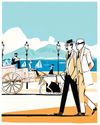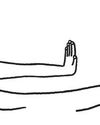
It is almost two hundred years since the death of Lord Byron. He succumbed to a fever on April 19, 1824, in the town of Missolonghi, on the west coast of Greece, at the age of thirty-six. As was far from unusual at the time, medical professionals did much to hasten the end that they were supposed to prevent. In Byron's words, "There are many more die of the lancet than the lance." Leeches, enemas, and blisteringthe deliberate raising of blisters on the skin-were part of the treatment. Byron was reluctant to be bled by his physicians, whom he slighted as "a damned set of butchers," but eventually surrendered to their efforts. One modern expert has estimated that, in his final days, they drained at least two and a half litres of his blood. It is surprising that the patient lasted as long as he did.
Byron had come to Greece the previous year, sailing from Italy, where he had been living since 1816. He was a British peer, and his poems have lodged him in the canon of English verse, yet the last eight years of his life were spent in exile. His liberal sympathies had always been fierily provocative, and his hope, on arrival in Greece, had been that he might lend his name, his title, his legendary lustre, and his considerable wealth to the cause of Greek independence in the fight against Ottoman rule. A naval officer, Captain Edw Blaquiere, had assured him that "your presence will operate as a Talisman-and the field is too glorious, too closely associated with all you hold dear, to be any longer abandoned." Yet here was Byron, expiring not in glory but in delirium, with an unavailing gaggle of doctors and servants, amid a Babel of English, Italian, and Greek, and, outside, the shout of a thunderstorm. "Half smiling, "one onlooker reported, the dying man said, "Questa è una bella scena." Or, "What a beautiful scene."
This story is from the March 04, 2024 edition of The New Yorker.
Start your 7-day Magzter GOLD free trial to access thousands of curated premium stories, and 9,000+ magazines and newspapers.
Already a subscriber ? Sign In
This story is from the March 04, 2024 edition of The New Yorker.
Start your 7-day Magzter GOLD free trial to access thousands of curated premium stories, and 9,000+ magazines and newspapers.
Already a subscriber? Sign In

BADDIE ISSUES
\"Wicked\" and \"Gladiator II.\"

LET'S MAKE A DEAL
\"Death Becomes Her\" and \"Burnout Paradise.\"

ANTI HEROES
\"The Franchise,\" on HBO.

FELLOW-TRAVELLERS
The surprisingly sunny origins of the Frankfurt School.

NOW YOU SEE ME
John Singer Sargent's strange, slippery portraits of an art dealer's family.

PARIS FRIEND - SHUANG XUETAO
Xiaoguo had a terror of thirst, so he kept a glass of water on the table beside his hospital bed. As soon as it was empty, he asked me to refill it. I wanted to warn him that this was unhealthy - guzzling water all night long puts pressure on the kidneys, and pissing that much couldn't be good for his injury. He was tall, though, so I decided his insides could probably cope.

WILD SIDE
Is Lake Tahoe's bear boom getting out of hand?

GETTING A GRIP
Robots learn to use their hands.

WITHHOLDING SEX FROM MY WIFE
In the wake of [the] election, progressive women, who are outraged over Donald Trump's victory at the ballot box, have taken to social media with public, vengeful vows of chastity. - The Free Press.

DEADLINE EXTENSION
Old age, reborn.